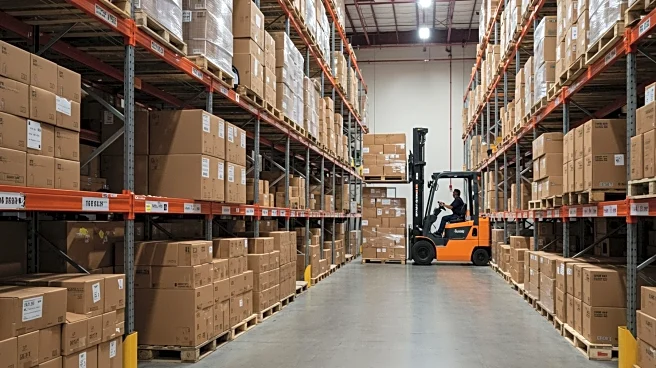What's Happening?
A recent report from CBRE, a Dallas-based industrial real estate firm, highlights a significant trend in the U.S. industrial leasing market. Third-party logistics (3PL) providers have secured 38 of the top 100 largest industrial leases in the first half of 2025, totaling 28.9 million square feet. This marks an increase from 28 leases in the same period last year. The report attributes this growth to large occupiers outsourcing more of their warehousing and supply chain operations. Retail and wholesale tenants, who led the market last year, signed 28 leases for 21.4 million square feet, while e-commerce leases dropped significantly to seven leases for 4.7 million square feet. The report also notes a decline in mega-warehouse leases, defined as warehouses 1 million square feet or larger, with only 13 leases signed compared to 31 last year. Southern California's Inland Empire led the regions with the most signed leases, followed by the PA I-78/I-81 Corridor and Dallas-Fort Worth.
Why It's Important?
The shift towards 3PLs in the industrial leasing market reflects broader changes in supply chain management and distribution strategies. Retailers and wholesalers are increasingly outsourcing distribution to reduce capital investment costs and gain flexibility in inventory management. This trend is expected to continue, with CBRE projecting further growth in 3PL market share. The specialization in product distribution and focus on technology are driving this shift, providing companies with insulation during economic and supply chain uncertainties. The decline in e-commerce leases suggests a reassessment of operations after a period of substantial growth, indicating a potential shift in how e-commerce companies manage their distribution networks.
What's Next?
CBRE anticipates that the demand for 3PL services will continue to rise, leading to an increase in mega-warehouse leases. As more companies outsource distribution, 3PLs are expected to expand their footprints, potentially leading to more large-scale deals. The focus on specialized distribution and technology will likely drive further changes in the industrial leasing market, with 3PLs playing a central role in managing complex supply chains. This trend could reshape the landscape of industrial real estate, influencing how companies approach logistics and distribution in the future.
Beyond the Headlines
The growing reliance on 3PLs may have long-term implications for the industrial real estate market and supply chain management. As companies prioritize flexibility and specialization, the role of 3PLs could become increasingly integral to business operations. This shift may also impact employment patterns within the logistics sector, as demand for specialized skills and technology-driven solutions grows. Additionally, the trend towards outsourcing could influence investment strategies in industrial real estate, with potential shifts in property values and development priorities.










